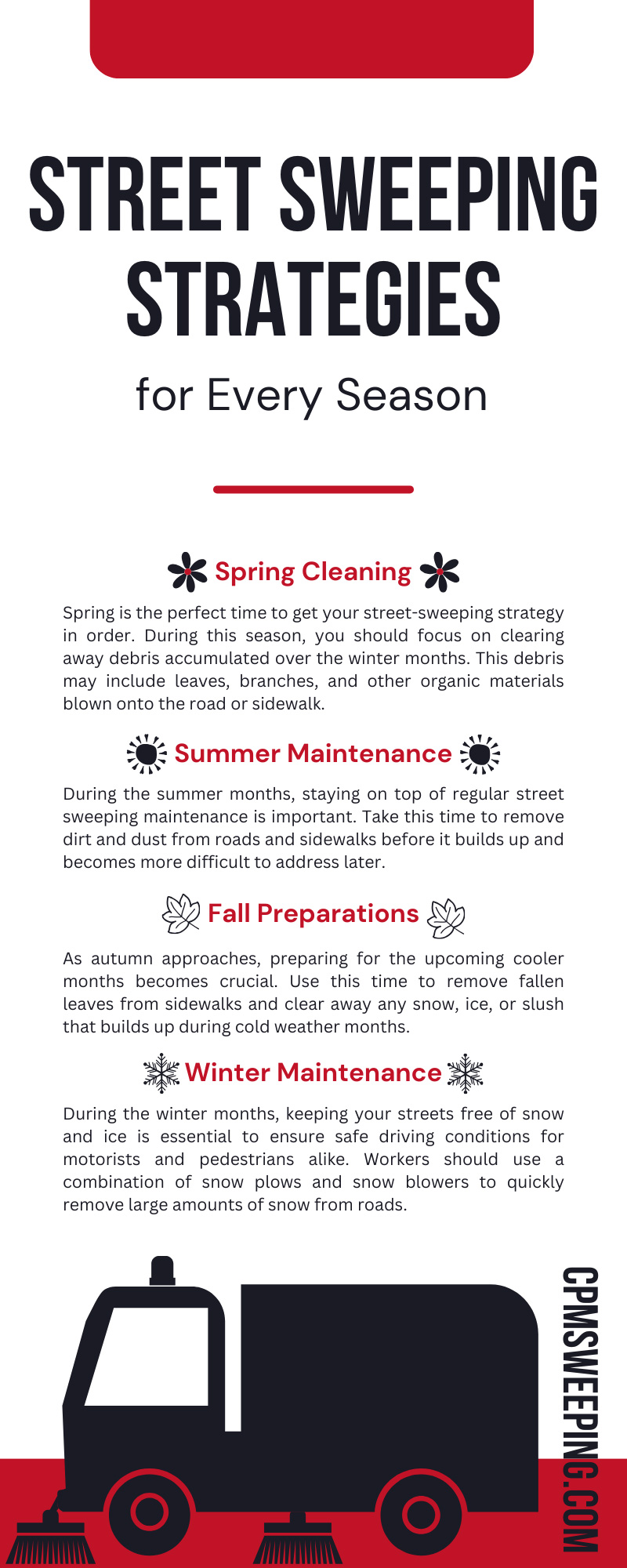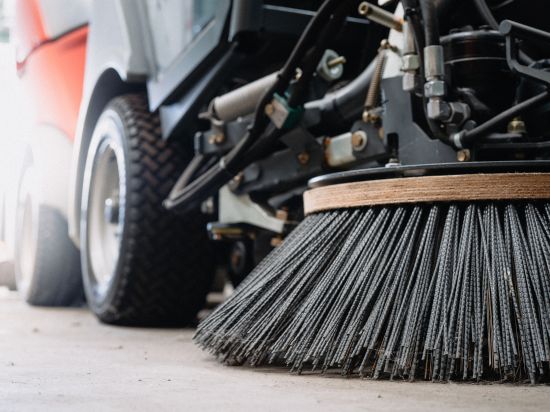Every season brings new challenges when it comes to caring for city streets. From the winter months, which may see heavy snowfall accumulation, to the spring months, when mud can cause slippery conditions, street sweeping is important for maintaining safety on public roads.
With proper strategizing and preparation, municipalities, construction companies, homeowners, and individuals from all walks of life can ensure their streets are safe by keeping them clean throughout every season. Explore the different strategies for specific seasons so that you can implement more successful street-sweeping practices.
Spring Cleaning
Spring is the perfect time to get your street-sweeping strategy in order. During this season, you should focus on clearing away debris accumulated over the winter months. This debris may include leaves, branches, and other organic materials blown onto the road or sidewalk.
Educate the Public
The first step in implementing effective street-sweeping strategies is to educate the public on why it is important. Street sweeping helps to reduce air pollution by removing dust, dirt, and debris from the streets.
It can also help to reduce flooding by clearing out storm drains and catch basins. Educating the public on these benefits will make them more likely to support street-sweeping initiatives.
Utilize Technology
Utilizing technology can also help to make street sweeping more efficient and effective. For example, GPS-enabled street sweepers can track their progress throughout an area, allowing crews to cover more ground in less time. Additionally, you can install sensors on street sweepers, which detect debris and allow crews to focus their efforts on areas with higher levels of debris accumulation.
Increase Enforcement
Increasing enforcement of existing rules and regulations can also help to ensure that streets remain clean during springtime. For example, laws prohibiting littering or dumping should be enforced more strictly during this time of year. Family outings, school breaks, and property cleanings often lead to increased levels of debris in the streets, which street sweepers must clean up.
Summer Maintenance
During the summer months, staying on top of regular street sweeping maintenance is important. Take this time to remove dirt and dust from roads and sidewalks before it builds up and becomes more difficult to address later.
Scheduling Sweeping Times
One of the most important strategies for street sweeping during the summer months is to schedule when it will occur. Scheduled cleanings make sure the process is as efficient as possible. In addition, scheduling sweeping times allows for better coordination with other city services, such as garbage collection and road maintenance.
Applying Dust Control Measures
Applying dust control measures is another important strategy for effective street sweeping during the summer months. These measures can include wetting down roads before sweeping, installing dust barriers along roadsides, and using water trucks to dampen roads after sweeping.
Dust control helps reduce dust levels, a major issue in residential neighborhoods where children may be playing outside. Furthermore, cleaner grounds allow people to enjoy outdoor gardening or exercise.
Fall Preparations
As autumn approaches, preparing for the upcoming cooler months becomes crucial. Use this time to remove fallen leaves from sidewalks and clear away any snow, ice, or slush that builds up during cold weather months. Different street sweeping strategies for each season result in preserved roads and safe environments.
Implementing Leaf Collection Programs
Scheduling regular street sweeping allows cities to implement leaf collection programs during the fall season and makes it easier for residents to dispose of leaves from their yards and gardens. These programs typically involve providing special bags or containers for collecting leaves, which city crews collect on designated days throughout the fall months.
This measure helps reduce city street litter while encouraging residents to properly dispose of their yard waste instead of dumping it into storm drains. Furthermore, it prevents debris from sticking out on sidewalks, where it can become a hazard or attract pests.
Vacuum Trucks
Vacuum trucks are another useful tool for collecting large amounts of debris from roads and sidewalks during the fall season. These powerful machines use suction power to quickly collect leaves, dirt, twigs, and other debris without leaving any mess or residue behind. Vacuum trucks also have the added benefit of collecting wet material, such as mud or slush, that may be difficult for manual sweepers to handle.
Winter Maintenance
During the winter months, keeping your streets free of snow and ice is essential to ensure safe driving conditions for motorists and pedestrians alike. Workers should use a combination of snow plows and snow blowers to quickly remove large amounts of snow from roads.
Pre-Treating Roads
Pre-treating roads with salt and other deicing agents is one of the most effective strategies for keeping roads safe during winter. The pre-treatment helps to prevent snow and ice from sticking to the pavement, which reduces the need for frequent street sweeping. Additionally, pre-treatment can help to reduce the amount of salt needed, as it prevents the snow or rain from carrying the salt away.
Plowing Streets
Plowing streets is another effective strategy for keeping them safe during winter. Plowing removes snow and ice from streets quickly and efficiently, allowing traffic to move more freely, even in inclement weather conditions. Additionally, plowing can help to reduce the amount of salt needed on roads, as it prevents it from being washed away by snow or rain.
Utilizing Anti-Icing Strategies
Utilizing anti-icing strategies, such as pre-wetting roadways with brine or using heated pavement systems, is also an effective way of keeping roads clear during winter. These strategies aid in thawing thick ice sheets without excessive amounts of salt or chemical deicers.
Anti-icing strategies help prevent snow and ice from sticking to pavements in the first place. As a result, it reduces the need for frequent street sweeping and the amount of chemicals used on roadways.
Post-Winter Cleanup
As winter passes, it’s important to conduct a thorough post-winter cleanup of streets and sidewalks to remove debris from winter storms or other activities such as plowing or salting operations. This cleanup should involve removing leftover sand or salt from roadways and sidewalks and picking up any litter or debris left behind by the public during winter storms.
Preserving streets and busy areas can help promote happy neighborhoods and even bring more traffic to local businesses. CPM Sweeping offers exceptional construction sweeper services in Nashville and supports construction sites through every project phase to ensure safety and debris control. Ask us about our street sweeping services today!


